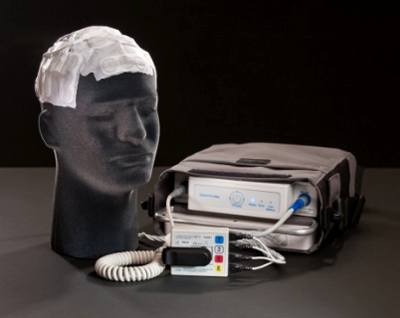Electric Field Treatment Offers New Standard for Newly Diagnosed Glioblastoma
Treating newly diagnosed glioblastoma with “tumor treating fields” is a safe and effective therapeutic option, according to a new trial.
NovoTTF-100A System (Novocure)

Treating newly diagnosed glioblastoma (GBM) with “tumor treating fields,” electric fields generated by electrodes on the skull that interrupt certain parts of the cell cycle, is a safe and effective therapeutic option, according to a new prospective, multicenter, randomized trial. Results of the EF-14 trial involving the NovoTTF-100A System (Novocure) were presented Saturday at the Society for Neuro-Oncology (SNO) Annual Scientific Meeting in Miami.
“Tumor treating field is an entirely novel treatment modality,” said Roger Stupp, MD, of Zurich University Hospital in Switzerland. “It is a kind of anti-mitotic therapy, with alternating electric fields disturbing cells during different phases of mitosis.” The therapy, delivered by a device worn on the skull for 20 to 22 hours per day, interferes with cell division, the cell membrane, and organelle assembly at crucial time points of cell growth.
The new trial included a planned interim analysis after 315 patients had follow-up data out to 18 months; the new results presented at the SNO meeting were of that interim analysis, and led to an early end to the trial because of its success.
The patients were randomized 2:1 to NovoTTF and temozolomide (210 patients) or temozolomide alone (105 patients). The median progression-free survival with NovoTTF was 7.1 months vs 4 months for temozolomide alone, for a hazard ratio (HR) of 0.63 (P = .001). Median overall survival was also better with NovoTTF, at 19.6 months vs 16.6 months, for a HR of 0.75 (P = .034). This translated to 24-month survival rates of 43% in the NovoTTF group and 29% for the temozolomide group.
The trial had a planned enrollment of 700 patients; 692 had been randomized by November 11, 2014, when the interim analysis was finalized, but the trial will not be stopped. “It is a positive phase III trial in newly diagnosed GBM, one of the few that we’ve had for a long time,” said Patrick Wen, MD, of Dana-Farber Cancer Institute in Boston and co-chair of the SNO meeting, during a press conference.
The NovoTTF device didn’t dramatically change the adverse event (AE) profile in the study. The most common AE in the NovoTTF group was skin irritation, in 45% of patients, though only 2% had severe irritation. Stupp said the possibility of increased seizures was a realistic concern, but in this study seizures occurred in 7% of both treatment arms. A total of 33% did report some psychiatric disorders, but Stupp said that was almost entirely anxiety about the device.
He added that the device continues to get smaller, and that carrying and wearing it is becoming less and less burdensome. “A new standard of care has been established for GBM patients,” he concluded.